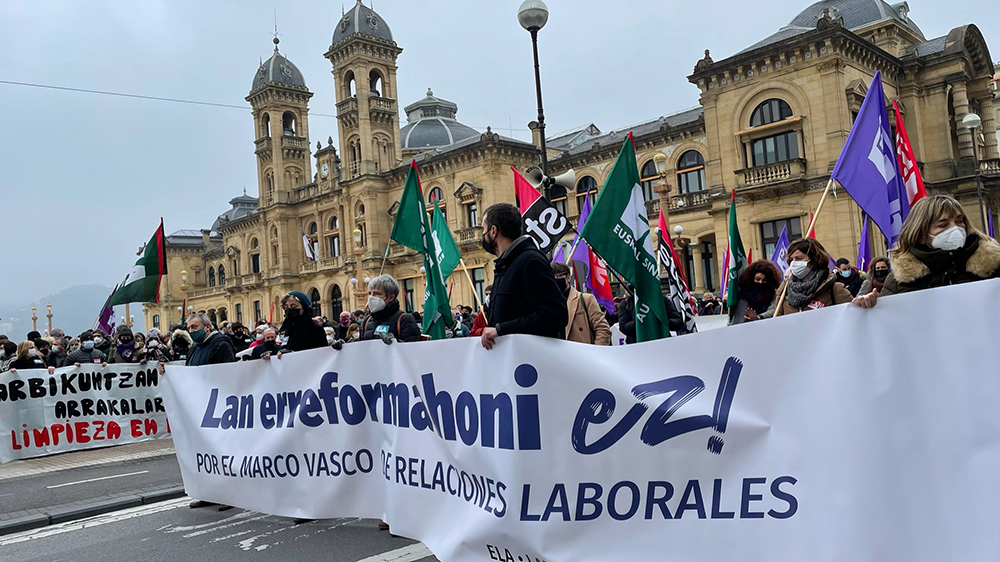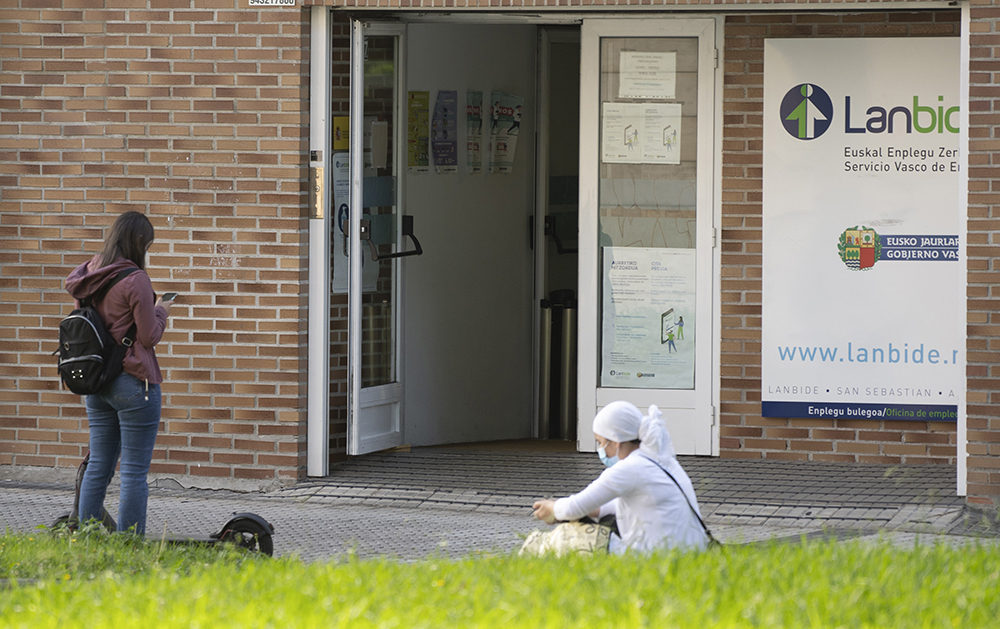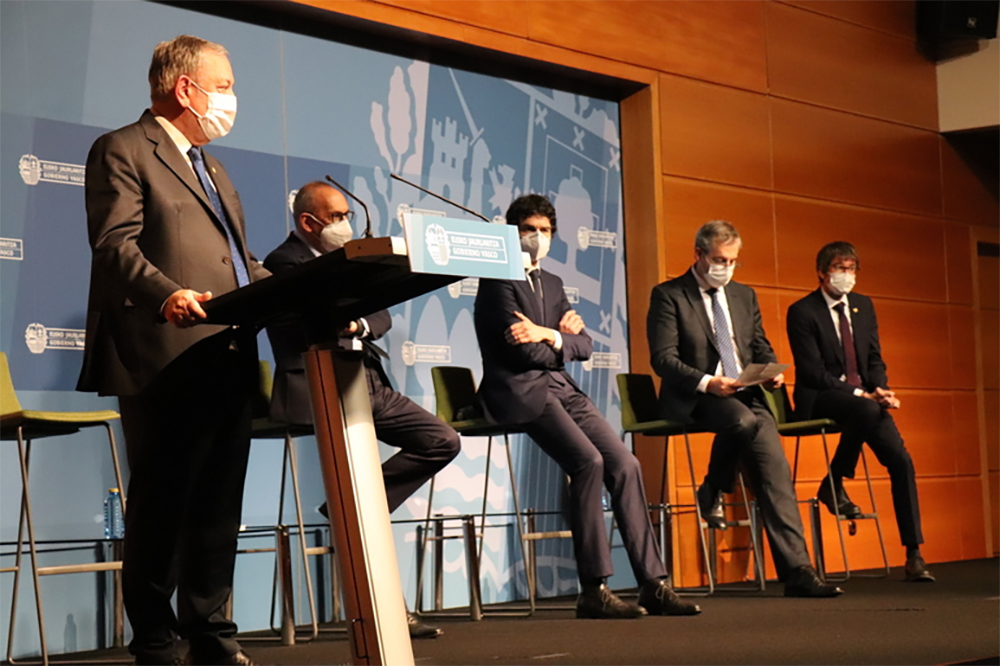2012 and 2022: Discover the seven differences
- Rather than repealing the 2012 Spanish labour reform, the Spanish Congress voted “to ratify” this law, among other things with the votes in favour of Citizens, has at least been denounced by many trade unions and Basque agents. Because it is so similar to the text adopted ten years ago by the government of Mariano Rajoy, finding differences between one and the other can turn into entertainment.

The labor reform approved on February 3 at the Madrid Congress has been the last step in a long process that has had a necessarily grotesque end, which has come out thanks to the error of a PP member. The vice-president of Spain, Yolanda Díaz, negotiated for months with the Spanish employers' association CEOE and with the unions CCOO and UGT, has little to do with one of the main electoral promises of the United Podemos and the PSOE: Abolition of the brutal labor reform by Mariano Rajoy 2012.
At the heart of the Rajoy reform is still there: in the negotiation of labour agreements the balance is clearly in favour of the employer.
The reform has been underway since the Government of Spain published in the general journal the royal decree-law 32/2021, but it needed the approval of the congress. To this end, Díaz has sought support among his usual partners, including the Basque nationalist parties, but on this occasion the PNV and EH Bildu have told him no. The new text, as the unions ELA, LAB, Steilas, ESK, Hiru and Etxalde have also pointed out, is accused of not respecting the Basque labour market and of continuing to make economic redundancies possible.
Díaz has not moved “any comma” of the text, as a result of the CEOE threat to leave the photo. It is this gesture that can best indicate the extent to which it is conditional on economic powers. At the heart of the Rajoy reform is still there: in the negotiation of labour agreements the balance is clearly in favour of the employer. Despite the fact that the law is making some progress, drawing closely resembles the 2012 labor reform, and the reader will find it hard to see the seven differences. Do you dare?
1. Ultraactivity
One of the main changes to the Spanish Government’s labour legislation is the reconversion of the impact of collective agreements into indefinite terms. This measure has been taken by the parties of the government PSOE and the United Nations Podemos, and by the Spanish unions CCOO and UGT, to argue that they have made profound changes in the 2012 labor reform. The law passed by Rajoy’s executive eliminated ultra-activity at first, but then it was imposed from a year onwards. In other words, if one year had elapsed since the termination of a pact no other agreement had been reached, the company would have established the minimum conditions of the Staff Regulations.
This happened, for example, when in 2013 the agreement of the service and cleaning company ATESE of the Balearic Islands was extinguished: from one day to the next, workers began to collect the Minimum Interprofessional Wage. But the case came to the Spanish Supreme Court in 2014, which opted for workers. This case law in practice restored ultra-activity and it could therefore be said that the current measure will not entail major changes.
.jpg)
2. Indefinite rise
Contracts for works have disappeared, and work contracts cannot be signed in succession, since the worker was left in a vulnerable situation and was a form of legal fraud. But the company still has the possibility to make occasional contracts, although seasonal work will become “undefined discontinuous”. Yolanda Díaz’s ministry had as a priority the end of the temporality, “consolidating indefinite hiring is betting on a future with labor rights and stability,” the minister wrote on Twitter, on the eve of the vote on the regulations in the Spanish Congress, supported by a graph that represented that indefinite contracts have increased from 9% to 15% in 2022.
But the dismissal of workers on permanent contracts will be as simple and cheap as before: a 33-day compensation for undue dismissal for each year worked. This measure was implemented by the 2010 reform of José Luis Rodríguez Zapatero, which used to be 45 days, and in 2012 it was generalized by Rajoy, while facilitating the layoffs of 20 days of compensation justified by objective reasons.
In addition, processing wages will not be recovered – the cost to be borne by the company in the event of dismissal, in the event that the worker is to be readmitted by court order – and collective redundancies can be carried out in the same way using the employment regulation dossiers.
3. Internal flexibility
In the midst of the 2012 labor reform debate, Adegi president Eduardo Zubiaurre said in an interview with Berria: “The model we like is flexibility.” In other words, flexibility in decision-making by the company translates into “security” for the maintenance of its work. In all these years we have seen that reality has eaten the second part of that word. And now, the members of the Spanish employers speak without complexes of the new labor regulations, as the CEOE president, Antonio Garamanedi, has done: “Internal flexibility mechanisms have not been touched,” he acknowledged.

Companies continue to be able to change working days, working hours, wages, mobility and other working conditions without great justification. On the other hand, the implementation of the Temporary Regulation Dossiers (TEU) will be easier depending on the context, and a system called RED has been created, which allows more belts to suspend the working relationship or reduce working days in the face of cyclical or sectoral crises.
4th. Sector wages
In the labor reform approved by the Rajoy government ten years ago, the company's labor agreements took precedence over those of the sector. Now, on the contrary, priority will be given to the sector. CCOO and UGT stress that this will lead to a substantial improvement in wages – EUR 12,000 in some cases – because companies will not be able to use their particular agreements to lower wages, as was the case in some service companies (cleaning, security companies…). But the priority of sectoral agreements has only been agreed on wages and not on other working conditions. In addition, in the case of Hego Euskal Herria, wages are already better, as explained to Hordago Pello Igeregi, head of Collective Bargaining of ALS: “In Euskal Herria, company agreements have not been used to make those in the sector worse, but to improve, because there has been a trade union pressure for this to be so.”
5. Limitations on subcontracting
Numerous representatives of workers and social partners have repeatedly denounced that subcontracting chains between companies are one of the main sources of precariousness and occupational risks. In Euskal Herria in 2020, 15% of the deceased were outsourced, according to the report prepared by the unions. This year, on 26 January, the last major occupational accident occurred in Cementos Añorga: a subcontracted migrant became invalid because the crane he was driving did not have adequate preventive measures.

Its advocates state that the labor reform of Yolanda Díaz will improve the conditions of the outsourced workers, but the revision of the text implies a substantial modification in Article 42: the subcontractors must respect the agreements of the “activity they carry out” sector, regardless of their social purpose or legal form. This measure will affect companies that offer a wide range of services, but only in terms of wages can other working conditions be imposed by the company. “We cannot allow workers of different levels; if we do the same we have to have the same labor rights,” explains Hordago Iratxe Álvarez of the ESK union.
6. Staging
Respect for the framework of Basque labour relations has been the main request of PNV and EH Bildu to the Government of Spain. On 3 February the PNV negotiated this condition until a few hours before the approval of the labour reform. However, the new regulations will give priority to state treaties on the autonomous framework.
.jpg)
In 2017 the unions ELA, LAB, CCOO Euskadi and UGT Euskadi and Confebask signed an agreement to establish labor agreements in the territories of the CAPV. But since this agreement has no place in the labor reform, the territorial agreements that will be signed have no legal guarantee, and are subject to the good will of Madrid, because “they can be contested by unions such as CCOO and UGT, which have obedience to the State”, as reporter Carlos Etxeberri reminded recently in News of Gipuzkoa, something like this has happened with the Basque. In the massive demonstrations on 30 January against labour reform in the capitals of Hego Euskal Herria, the Basque trade union majority said aloud, in the reading that was made public at the end: “Decisions on the working and living conditions of Basque workers must be made in the Basque Country and not in Madrid.”
7. Social dialogue
.jpg)
(Image: @grafismo)
It has been a word that can be lengthened and handled like a gum when social dialogue has moved into the workplace, and in this case it has not been an exception either. The PP did not need an agreement between the state unions and the employers CEOE to get the law out of 2012. But to the government of Sánchez, Brussels imposes two conditions for receiving European funds: reducing temporality and agreeing between unions and employers how to do it. They have therefore reached an agreement on this occasion – they had to do so – to which they have called “social dialogue”.
It is clear that the conditions signed by the Spanish Government with the EU have enabled the CEOE to negotiate a labour reform more than thirty times more. And what for many is a veto right has become very apparent after the employer’s threat of not accepting it “if we change a comma” of the decree. In short, perhaps in ARGIA (No 2.764) As economist Endika Alabort said, this is the labour reform of the European Union.
.jpg)
2012ko erreforman lan eskubideek murrizketa basatia ekarri zuen. Ordukoan, argudio nagusia zen lan-merkatua oso zurruna zela, eta lan-baldintzak ezin zirela egokitu egoera ekonomiko larrira. Baina hamar urteotan erreformaren ondorioak ikusiz gero, teoria antzua da, eta Kataluniako Taifa ekonomia kritikoaren seminarioak datu batzuk eman ditu hori erakusteko.
2008ko krisiaren ondoren, 2015 eta 2017 artean Espainiako Estatuko BPGa %3,8 eta %3 artean hazi zen, baina enpleguaren hazkundea motelagoa izan zen, %0,9 eta %2,7 artean. 2019an enplegu-tasa oraindik 2007koa baino %4,4 baxuagoa zen. Soldatei dagokienez, 2019an ordainsariek BPGren %46,3 suposatzen zuten, 2017an baino puntu bat gutxiago (%47,3).
Taifa seminariokoen ustez, ebidentziek erakusten dute kontratazio mugagabea sustatzea kaleratzeak merkatuz edo lanpostuen murrizketa saihestu nahi izatea “barne malgutasunarekin”, porrot egindako politika baten parte direla. “Inongo ikerketak ezin izan du erakutsi soldaten igoerak, kaleratzeen kostuak eta lan-baldintzen egonkortasunak pisu nabarmenik dutenik enplegua sortzearen kontra”.
It seems that in Navarra the difference between high and low wages has grown the most. The increase in CPI in 2021 has been the largest in recent decades, and workers with dignified agreements will not lose purchasing power, but for most it will not. The fissure will rise... [+]
Ba joan den osteguneko lan-erreforma yolandikoaren botazioak harrapatu ninduen Shakespeareren Hamlet irakurtzen –ez galdu Juan Garzia Garmendiak egindako itzulpena, beste galaxia batera darama irakurketaren plazera–; eta Madrilgo diputatuak, saiatu behintzat, saiatu... [+]
Sayas eta Adanero diputatuek Espainiako Kongresuan lan erreformaren aurkako botoa eman dute, eta UPNk aktak itzul ditzaten eskatu die. Izatez, UPNk iragarri zuen babestu egingo zuela gobernu koalizioa, eta, ordainetan, PSNk bertan behera utziko zukeen “adierazpen... [+]
Espainiako Gobernuak CEOErekin eta CCOO eta UGT sindikatuekin adostutako testuari onespena eman dio ostegun arratsaldean Espainiako Kongresuak, baina Pedro Sánchezen inbestidura ahalbidetu zuten oposizioko alderdien babesik gabe oraingoan.
Espainiako Kongresuan lan erreformaren alde bozkatzea eskatu die UPNk bere bi diputatuei, eta horren lehen ondorioetako bat izan da PSNk Enrique Maya UPNko alkatea gaitzesteko egina zuen eskaera kendu egin duela. Gainera, udal aurrekontuak aldatzea ere babestuko dute alderdi... [+]
ELAk, LABek eta ESK-k EAJri eta Podemosi eskatu diete kaleratzeak bultzatzen dituen eta lan-harremanen esparrua errespetatzen ez duen lan-erreformaren aurka bozkatzea. Hala jakinarazi diete bi alderdi politikoei, gaur, urtarrilak 31, egindako bileretan. Bilera horiek EH... [+]
Hego Euskal Herriko lau hiriburuetan milaka lagun atera dira, Espainiako Kongresuan otsailaren 3an bozkatuko den "lan erreforma horri" ezetz esateko. ELA, LAB, STEILAS, ESK, Etxalde eta Hiru sindikatuek deitutako manifestazioetan salatu dute "Espainiako Gobernuak... [+]
Aste honetan salgai jarriko da produktu berri bat edo, bueno, produktuaren bertsio berri bat behintzat: Espainiako lan erreformaren erreforma. Trajea aukeratu behar da hori nola saldu asmatzeko. Eta iruditzen zait EAJk azken asteetan bi atera dituela bere armairu amaigabetik.
ESK-ko Koordinakunde Nazionaleko kideak ezkerrak gobernuan dagoenean dituen konplexuak salatzen ditu, eta kaleak berreskuratzeko jarrera irmoa azaldu du.
UGT Euskadiko Berdintasuna, Gizarte Politikak eta Aniztasuna alorreko idazkaria pozik agertu da akordioarekin, baina borrokatzen eta negoziatzen jarraituko dute.
CNTko Bilboko Ekonomialaria Elkarrizketa Sozialaren mahaian adostutako lan erreformaren kontra agertu da, ez dituelako iraultzen 2012ko erreformaren oinarriak
LABeko Ekintza Sindikaleko eta Negoziazio Kolektiboko idazkariak borrokaren bidez eragiteko aukera dagoela uste du, eta urtarrilaren 30eko mobilizaziorako deia egiten du.
Arkaitz Antizar CCOO Euskadiko Gazteria idazkaria eta batzorde exekutiboko kidea da. Lan erreformarako akordioaren egileetariko bat izan da CCOO, lan legediaren orain arteko norabidea aldatzen duelakoan. Hala ere, aurreko erreforma partzialki soilik derogatu duela ikusita, berau... [+]

























